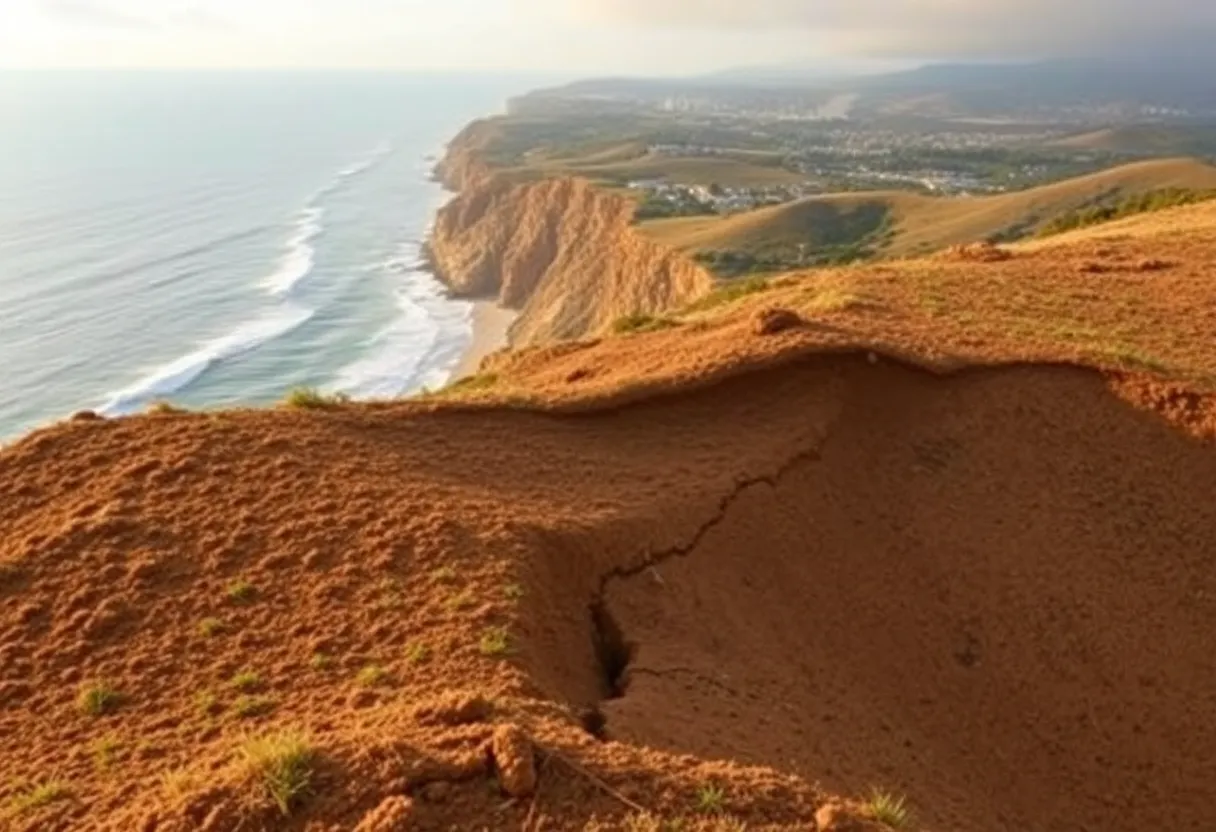News Summary
California Safe Soil LLC has announced its decision to cease operations and liquidate its assets following significant landslide risks affecting the Rancho Palos Verdes area. This decision comes after power and gas shutdowns impacted hundreds of homes due to ongoing landslide activity. Recent studies highlight the dangers of living in landslide-prone areas, as previous dormant lands may shift with heavy rainfall or seismic activity. Buyers are urged to research historical land movements to ensure property safety in these hazardous zones.
California – California Safe Soil LLC has ceased operations and is moving forward with plans to liquidate its products and auction off its equipment. The decision comes in the wake of serious landslide risks that have recently affected the Rancho Palos Verdes area, prompting power and gas shutdowns for hundreds of homes over the last two months.
The ongoing landslide activity in this region highlights the dangers associated with living on land susceptible to erosion and shifting. Recent studies indicate that deep-seated landslides can occur weeks or even months after significant rainfall events, as water percolates down into weak rock zones. These landslides typically manifest themselves on moderately steep slopes, posing a hidden risk to nearby properties.
Last July, a considerable landslide occurred in nearby Rolling Hills Estates. Research conducted by UCLA and NASA revealed that this incident was preceded by prior land movement, underscoring the unpredictable nature of such geological events. The California Geological Survey has responded by producing a comprehensive map that indicates much of the state’s coastline is vulnerable to landslides.
Homes that were constructed several decades ago on previously dormant landslide areas may become active to significant land changes such as heavy rainfall or seismic activity. Often, the warning signs of potential landslides are subtle and concealed beneath the surface, complicating detection efforts. As such, property buyers in these hazardous zones are encouraged to conduct thorough research regarding land movements and their associated risks.
Sellers are mandated to disclose whether a property is situated within a seismic hazard area; however, information regarding landslide risks may not be comprehensive. Websites like Realtor.com and Redfin.com do provide data on various natural disaster risks for properties, but they often fail to cover landslide specifics. Prospective buyers are advised to search online for historical landslide events in neighborhoods they are interested in, as well as consult the California Geological Survey’s numerous mapping resources.
For those seeking to detect land movement, Google Earth Pro can prove useful, allowing users to access historical images and identify changes over time. Visible signs of land instability may include cracks in the ground and ground heaving. To gain further insight, potential buyers should consider hiring home inspectors who can evaluate properties for signs of past land movements, providing an additional layer of protection.
Individuals living in areas prone to substantial earth movements may encounter challenges when attempting to secure affordable insurance against landslide damage. A Difference in Condition (DIC) insurance policy might cover such risks, although it typically comes with elevated premiums and deductibles, making it a significant financial consideration for homeowners.
As the situation in Rancho Palos Verdes offers a stark reminder of the geological conditions affecting much of coastal California, both current residents and future property buyers must remain vigilant. Understanding the risks associated with landslides and accessing up-to-date information and resources will be essential in safeguarding properties and ensuring informed decision-making in the face of natural hazards.
Deeper Dive: News & Info About This Topic
- Los Angeles Times: Homebuyers Beware
- Wikipedia: Landslide
- Curbed: Earthquake Map California
- Google Search: Liquefaction California
- Business Insider: Earthquake Expert Advice
- Google Scholar: Earthquake Risk California
- KESQ: Liquefaction Hazard
- Encyclopedia Britannica: Seismic Wave
- Fox 5 San Diego: School Closure Due to Sinking Risk
- Google News: Landslide Risk

Author: STAFF HERE SAN DIEGO WRITER
The SAN DIEGO STAFF WRITER represents the experienced team at HERESanDiego.com, your go-to source for actionable local news and information in San Diego, San Diego County, and beyond. Specializing in "news you can use," we cover essential topics like product reviews for personal and business needs, local business directories, politics, real estate trends, neighborhood insights, and state news affecting the area—with deep expertise drawn from years of dedicated reporting and strong community input, including local press releases and business updates. We deliver top reporting on high-value events such as Comic-Con International, San Diego County Fair, and San Diego Pride Festival. Our coverage extends to key organizations like the San Diego Regional Chamber of Commerce and United Way of San Diego County, plus leading businesses in biotechnology, healthcare, and technology that power the local economy such as Qualcomm, Illumina, and Scripps Health. As part of the broader HERE network, including HEREAnaheim.com, HEREBeverlyHills.com, HERECostaMesa.com, HERECoronado.com, HEREHollywood.com, HEREHuntingtonBeach.com, HERELongBeach.com, HERELosAngeles.com, HEREMissionViejo.com, and HERESantaAna.com, we provide comprehensive, credible insights into California's dynamic landscape.


